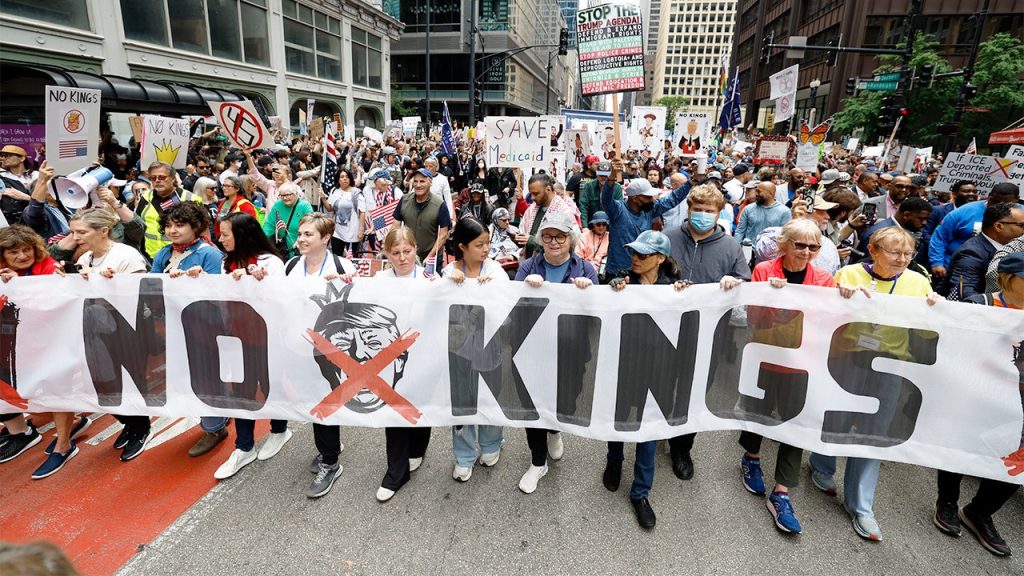Americans Take to the Streets in Nationwide “No Kings” Protest Movement
In a powerful display of civic engagement, hundreds of thousands of Americans joined the second wave of “No Kings” protests on Saturday, expressing their concerns about the Trump administration. From the bustling streets of New York City to the national monuments of Washington D.C., and even across the Atlantic in London, citizens gathered peacefully to voice their political opinions amid an ongoing government shutdown. The New York Police Department reported more than 100,000 participants across all five boroughs, with the remarkable note that not a single “protest-related” arrest was necessary. Similarly, Washington D.C. saw large crowds assemble without incident, although some demonstrators briefly spilled into the streets. The nationwide movement reached far beyond these major metropolitan areas, with significant gatherings in Chicago, Los Angeles, Houston, Boston, Atlanta, Portland, Austin, and approximately 2,500 other locations across all fifty states.
The demonstrations have emerged as a fascinating point of political contention, with Republican leaders suggesting they serve primarily as a distraction from the government shutdown negotiations. House Speaker Mike Johnson expressed hope that Democratic leaders participating in the protests might become more amenable to Republican proposals afterward, though he appeared skeptical about this possibility. The partisan divide was evident in how public figures characterized the gatherings—while Republicans framed them as politically motivated distractions, Democratic leaders and participants described them as genuine expressions of democratic values. Senator Bernie Sanders, who addressed the Washington D.C. crowd, rejected criticisms by describing the event as a “Love America rally” and later thanked the “millions of Americans who turned out in small communities and big cities all over this country to say loudly and boldly: No more kings. In America, We the People will rule.”
Despite the massive turnout and heightened emotions surrounding American politics today, the demonstrations remained overwhelmingly peaceful across the country. This peaceful character stands as a testament to the protesters’ commitment to democratic principles and civic responsibility, even as they voiced strong opposition to what many participants characterized as authoritarian tendencies in the current administration. California Governor Gavin Newsom articulated this sentiment on social media, writing that “California will keep peacefully pushing back against the Trump Administration’s authoritarian takeover.” The generally non-violent nature of the protests challenges preconceptions about political demonstrations in today’s polarized environment and highlights the capacity for passionate yet peaceful civic engagement.
While most cities reported no incidents, there were isolated exceptions that underscored the tensions surrounding the demonstrations. In Portland, Oregon, police confirmed that three individuals were detained following an alleged assault connected to the protests, with one person ultimately booked into jail while two others remained detained pending further investigation. Outside Chicago in Broadview, approximately fifteen people were arrested by Illinois State Police near an Immigration and Customs Enforcement facility. Denver authorities reported making several arrests after dispersing a small group attempting to access a highway. These incidents, though relatively minor given the scale of nationwide participation, reflect the complex nature of large-scale protest movements and the challenges faced by both demonstrators and law enforcement in maintaining public order while respecting constitutional rights.
The “No Kings” movement represents more than just opposition to a particular administration—it embodies a broader conversation about American democratic values and the balance of power within our government. The name itself evokes the nation’s revolutionary origins and founding rejection of monarchy in favor of democratic governance. By framing their concerns in these historical terms, protesters are connecting contemporary political debates to fundamental American principles established at the nation’s founding. This historical resonance appears to have struck a chord with many Americans across diverse communities, from urban centers to small towns, contributing to the movement’s impressive scale and geographical reach.
As the nation continues to navigate a period of significant political division and an ongoing government shutdown, these demonstrations reveal both challenges and sources of hope in American civic life. On one hand, they highlight the deep disagreements that currently characterize American politics. On the other, they demonstrate the continued vitality of peaceful protest as a cornerstone of democratic participation. The ability of hundreds of thousands of Americans to assemble peacefully, express their views passionately but non-violently, and then disperse without major incident suggests an underlying resilience in American democratic culture that transcends partisan divisions. As the government shutdown continues and political tensions remain high, this commitment to peaceful civic engagement may prove an essential resource for navigating the difficult path forward.















